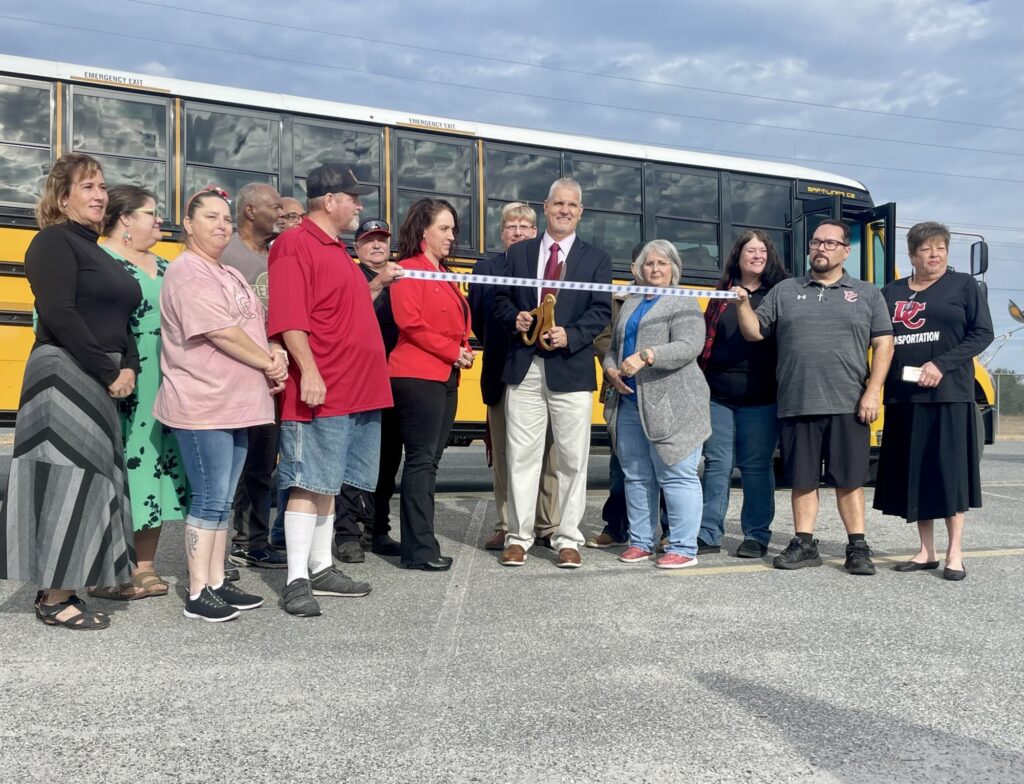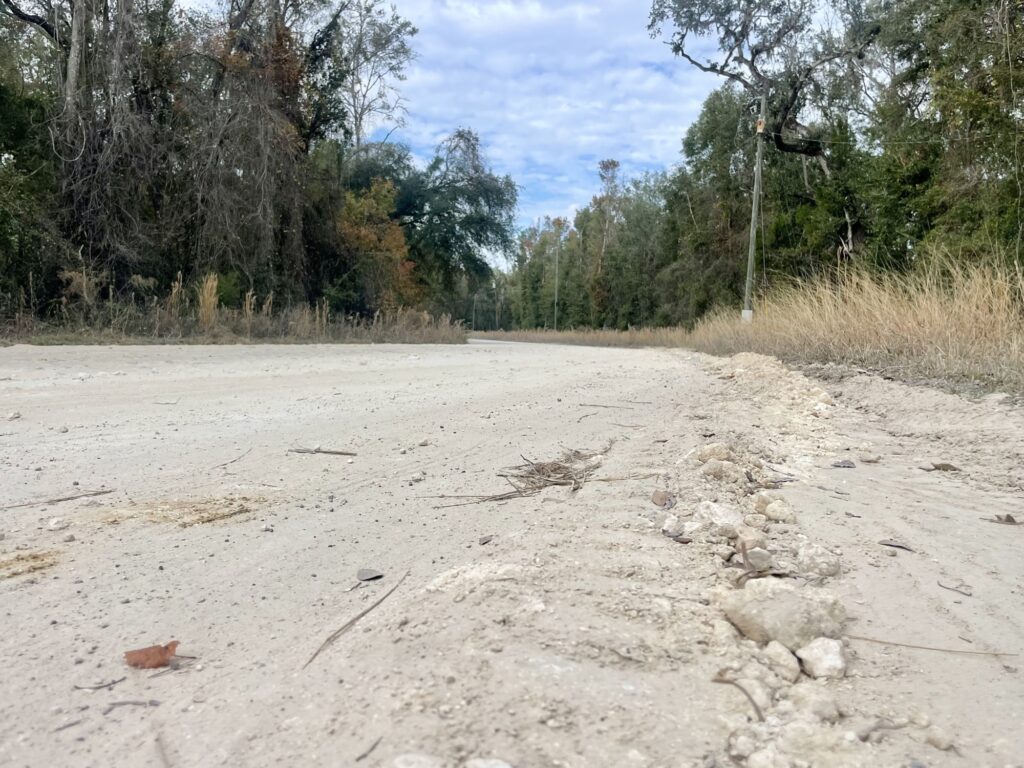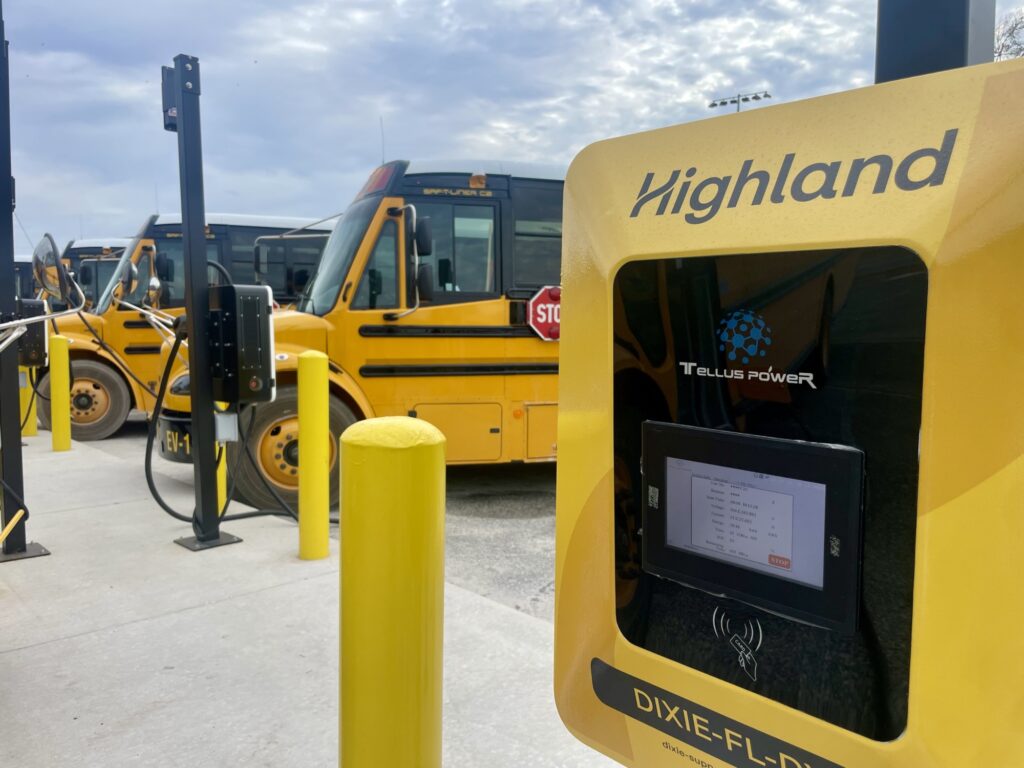By Mia McCormick, Environment Florida
“This is exciting!” Dixie County School District Superintendent Mike Thomas exclaimed from the podium with a broad smile on his face. “Our students, they deserve this.”
“Amen!” said a voice from a small audience listening in.

After an opening prayer, a few members of the press, district officials and others gathered for the ribbon-cutting dedication of 23 new electric school buses and chargers at the school bus depot. With a population just over 17,000, Dixie is the first rural county in Florida to complete an electric school bus project of this size.
There was relief in the voice of Paul Bennett, the school district’s director of safety, facilities and special projects. “This has been a long project, we started the grant process in 2022 after maintenance director Wesley Suggs and I drove 2 kinds of electric school buses ourselves.” Bennett said some of the district’s old diesel buses are from 2002. None of them have air conditioning and when you ride with the windows down, dust from the county’s dirt lime rock roads flies in.
Dixie County School District had a wide range of support for the project. With help from the commissioners who voted for it, Highland Fleets, Matthews Buses and Duke Energy, they are finally ready to see and feel the benefits of the ambitious project. The partnerships created a blueprint for how other cash-strapped districts could apply for their own new electric fleet.
Darnell Gainey has been driving school buses for 33 years in Dixie, she says the students are ecstatic. “The kids are so excited to have air conditioning! It was freezing last week and they still asked me to turn it on!” Gainey and the rest of the district’s drivers have been driving the new buses on their routes for about a week. “I want to thank everyone who had a part in making this happen for this little community.”
Setting the precedent

The transition to electric school buses in Dixie County is an important test. They must perform in rough rural conditions over mostly dirt roads. The longest bus route is 98 miles round trip. Officials say these buses can go between 130 and 160 miles on a single charge. But some residents were still skeptical of the technology and the process.
That distrust was a roadblock school officials had to overcome. “People thought Dixie County was going to pay for these buses, they didn’t realize it was grant money.” Wesley Suggs said. He is in charge of keeping the electric buses running, and expects the county to save a significant amount on fuel and maintenance costs. “Also people tried to make it a Democrat or Republican issue, but it’s not about that.” Showing people the transition was about student health and not politics had to become part of the plan.
The courage of these dedicated local leaders is inspiring. While Florida has the second-most electric vehicle charging stations in the nation, none of them are located in Dixie County. This technology is often new to rural communities so bringing it in can be an uphill battle. If electric buses are successful here, other rural counties in Florida are likely to apply for their own federal grants.
Students win with cleaner air

“These kids are the lifeblood of our county,” said two-term County Commissioner Jody Stephenson. His father was a commissioner for 32 years and his grandma drove a school bus. He used to get a headache and feel sick when he rode them growing up.
“Our kids will get a better education because they will feel good when they get to school.” Stephenson said. He couldn’t remember ever seeing a new bus in Dixie County.
All of it was made possible through a grant program created by the Bipartisan Infrastructure Law. Our 2024 state of electric school buses report shows that numbers of electric school buses are growing in districts across the country, thanks in part to large investments from Congress like this one. The Environmental Protection Agency recently announced 70 new recipients of grants to transition heavy-duty diesel fleets like school buses to cleaner alternatives.
Right now, districts can apply for the latest round of rebates through the Clean School Bus Program. The application period ends Jan. 9.
Mia McCormick is an advocate with Environment Florida, a policy and action group with one mission: to build a healthier, greener Sunshine State. This piece was originally published at: https://environmentamerica.org/florida/articles/rural-florida-district-gets-23-new-electric-school-buses/.
Sign up for The Invading Sea newsletter by visiting here. To support The Invading Sea, click here to make a donation. If you are interested in submitting an opinion piece to The Invading Sea, email Editor Nathan Crabbe at nc*****@*au.edu.



